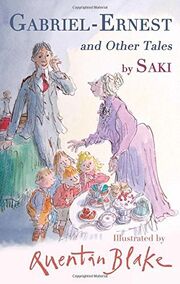
Cover of a paperback edition of Saki's stories including "Gabriel-Ernest."
"Gabriel-Ernest" is a short story by the British author Hector Hugh Munro who wrote under the pseudonym of Saki. The story first appeared on May 29, 1909, in the Westminster Gazette. It was later collected in the 1910 anthology Reginald in Russia and Other Sketches.
In the story, a country gentleman named Van Cheele finds a wild adolescent boy living on his woodland property. The boy claims to hunt at night and feed on birds, small animals, and even children. Van Cheele orders the apparent poacher out of his woods, and the boy obliges by moving into Van Cheele's house. Van Cheele discovers the truth about the boy too late to prevent a tragedy.
"Gabriel-Ernest" is one of the darker tales written by Saki. Unlike the better-known "Sredni Vashtar", however, its tone is wryly humorous. Although it is often included in horror and supernatural anthologies, the story is generally regarded as a dark comedy.
Plot
Van Cheele is driving a departing guest, an artist named Cunningham, to the train station when his guest mentions that there is a wild beast in his woods. Van Cheele asks what he means by "a wild beast" but Cunningham will say nothing more.
That afternoon, while taking a walk through his woodland property, Van Cheele sees a boy of about sixteen drying his naked wet body on a stone shelf overhanging a pool. The wild-looking boy watches Van Cheele with his gleaming eyes. Van Cheele asks the boy where he lives, and the boy replies that he lives in the woods. Van Cheele is incredulous but the boy insists and says he hunts at night and feeds on rabbits, wild fowl, poultry, lambs, and children – although it has been two months since he caught a child. Ignoring the last remark and wishing to get rid of a poacher, Van Cheele orders the boy out of his woods. The boy dives into the pool then, with an astonishingly quick move, he pops up like an otter near Van Cheele. Startled, Van Cheele falls back. The boy laughs in a half snarl then dives and disappears.
On his way home, Van Cheele ponders some recent local incidents. Chickens and lambs have gone missing as well as the game in the woods. He also thinks about the miller's child who disappeared two months ago, thought to have been swept away by the millrace. His aunt notices at dinner that night that Van Cheele is unusually silent. He is still bothered by the encounter and also by the possibility of himself being held responsible for the disappearing lambs and poultry if the boy is seen on his property.
The following morning, Van Cheele walks into his morning room and finds the boy sprawled on the ottoman. The boy calmly reminds Van Cheele that he told him to get out of the woods. Van Cheele has just enough time to spread the Morning Post[1] on the naked boy before his aunt enters. Van Cheele desperately explains to his aunt that the boy has lost his way and his memory as well as his clothes. His aunt decides they must take care of the boy and sends for some clothes. Cleaned up and clothed, she finds the boy sweet and declares they shall call him "Gabriel-Ernest" until they learn his real name.
In the mean time, Van Cheele's apprehension grows as he sees both his dog and his canary terribly frightened by Gabriel-Ernest. He decides to take the train to the neighboring town to see Cunningham to find out what he saw in the woods. He drives to the station leaving the boy with his aunt who is preparing to entertain children from her Sunday school class.
Cunningham is reluctant to talk at first, but he eventually tells Van Cheele what he saw on the last evening of his stay. He says he was watching the sunset when he noticed a naked boy standing on the hillside. The boy was so picturesque that Cunningham considered engaging him as a model. Then the sun set and, to his astonishment, the boy vanished and in his place stood a large wolf.
Even before Cunningham finishes speaking, Van Cheele starts running toward the train station. By the time he arrives home, the sun is already beginning to set. He finds his aunt putting away the jams and cake the children did not finish. Gabriel-Ernest is not there. His aunt says she asked the boy to take a small child home because it was getting late. Van Cheele rushes out after the children along a narrow lane with the millstream on one side and the hillside on the other. As he nears a curve, the sun sets and darkness falls. Van Cheele hears a scream and stops running.
Only the clothes worn by Gabriel-Ernest are found in the road. It is assumed that the young child fell into the stream and Gabriel-Ernest stripped and jumped in trying to save him. At the request of Van Cheele's aunt, a memorial plaque is dedicated at the church to "Gabriel-Ernest, an unknown boy, who bravely sacrificed his life for another." Van Cheele, however, has refused to subscribe to it.
See also
Footnotes
- ↑ H.H. Munro worked as a foreign correspondent for the Morning Post from 1902 to 1908 before returning to London. "Gabriel-Ernest" was one of the earliest stories published after he became a full-time writer.
